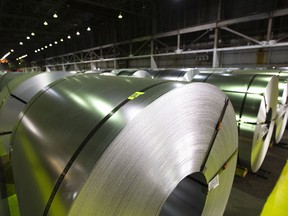Industry Groups Urge Government to Implement Tariffs on Chinese Aluminum and Steel
In a recent press conference in Ottawa, Catherine Cobden, president and chief executive of the Canadian Steel Producers Association (CSPA), emphasized the importance of implementing tariffs on Chinese aluminum and steel to combat dumping. The call to action from the industry groups follows the U.S. government’s announcement in May that it will implement a 25% increase on tariffs for Chinese steel and aluminum.
Background: A Growing Concern
The Canadian Steel Producers Association represents 13 steel companies, including Stelco, Algoma Steel Inc., and Rio Tinto Fer et Titane. Cobden was joined by Jean Simard, president and chief executive of the Aluminium Association of Canada (AAC), which represents Canada’s three main aluminum producers: Alcoa, Aluminerie Alouette, and Rio Tinto.
The U.S. has already implemented tariffs on Chinese steel and aluminum, as well as other products such as electric vehicles (EVs), semiconductors, critical minerals, and batteries. In response to concerns that Chinese steel and aluminum producers could circumvent these new trade measures through Mexico, Mexican President Andrés Manuel López Obrador released a joint announcement with U.S. President Joe Biden in July. The announcement added an additional 10% tariff on aluminum and a 25% tariff on steel that is not melted in Mexico.
Canada’s Response: A Consultation Period
Last month, Finance Minister and Deputy Prime Minister Chrystia Freeland announced consultations with Canada’s EV and related supply chain industries in response to these new trade measures. The 30-day consultation period ended on August 1, but no formal announcement has been made regarding whether Canada will apply measures in accordance with Section 53 of the Customs Tariff Act.
Why Immediate Action is Necessary
Cobden argues that failure to act on this in a timely way could mean the loss of jobs. The steel industry in Canada currently employs 23,000 Canadians directly and supports 100,000 jobs indirectly. The aluminum industry employs 9,000 people while supporting 20,000 jobs indirectly.
Despite 34 direct tariffs on China’s steel, we still see a doubling of Chinese steel in our market over the last several years," said Cobden. "It is simply not enough to combat the overcapacity of steel and aluminum coming from China."
The Risk of Inaction
Industry groups also highlighted the risk Canada’s inaction could pose to North American trade relationships in the future.
"It would lead to inevitable challenges with our largest trading partner," said Cobden. "We think it’s imperative that the government meet the moment, keep our CUSMA partnership whole, as well as protect our domestic steel and aluminum industries."
Conclusion
The Canadian Steel Producers Association and Aluminium Association of Canada are urging the government to take immediate action to implement tariffs on Chinese aluminum and steel. Failure to do so could result in job losses and damage to North American trade relationships.
What’s Next?
It remains to be seen whether the Canadian government will follow through with implementing tariffs on Chinese aluminum and steel. The industry groups are urging the government to take a strong stance against dumping and protect domestic industries.




